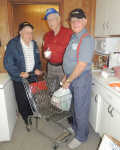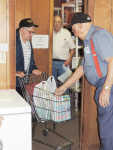Doing What Needs To Be Done

McCOOK, Nebraska -- They all grew up during the Depression in the 1930s. They all served their country during World War II. And now, in their 80s and 90s, they are all volunteering at the McCook Food Pantry.
Bill Loop, 93, Lester Webb, 88, and John Sines, 90, all of McCook, show up every Wednesday at the pantry and do what needs to be done. Loop pushes grocery carts of food out to cars for clients. Webb fills those grocery carts. And Sines greets people and fills out the necessary paperwork.
The unofficial ringleader of the crew, Bob Hardy of the Pantry, a youngster at 82, knew all the men from an informal coffee club that met regularly at McDonalds. He "enlisted" them one by one to volunteer at the pantry.

"Yeah, they take orders well," he joked of the three veterans, with Sines being one of the first recruits.
"They told me they just bought a new chair with wheels and they needed someone who would make sure the chair didn't run away," Sine joked. Hardy could see that Sines was down in the dumps after his wife died and urged him to come up to the Pantry and try it out, Sines remembered.
That was five years ago, and Sines still hasn't left.
"I need to get out and be among people. All my life I've been around people and I'm comfortable with that," he said. "I think I'm doing people good, but really, it's doing me good."
Sines grew up in the McCook area and quit high school to join the Navy in World War II. He was a ship's carpenter mate and stayed on a ship on the Pacific for two years.
One of the most perilous trips he took was two weeks after the Pacific War ended and he and his crew were escorting convoys for occupation in Korea. The Japanese had orders to cut loose all ocean mines, Sines said, so he and others shot at the mines so they would explode. Staying out the reach of an Okinawa typhoon was another close call, he said, when he was on a 130-foot long patrol ship that "was known to go over one (wave) and under two."
After the war, he worked for Otto Oil in McCook, later Otto Gas, then for Bollerup propane for 35 years, now known as Kugler's.
Webb, like the rest of his buddies at the Pantry, grew up during the Depression and remembers walking up over fence lines buried in the dust, where he lived near Bartley, Nebraska. With little food for families and less for livestock, the weed, Russian Thistle, was bound up and given to cattle to eat. It still wasn't enough. He recalled with emotion how cattle that was purchased by the government for $17 a head were herded to a huge pit by the railroad yards and shot. Didn't matter if the cow was 99-years-old or a new calf, they all got $17 per head, Webb said, remembering his white cow and her calf, Snowball. It was good money back then, he added, but it still hurt to see the cattle slaughtered.
Webb served in the U.S. Army Air Force where they "kept shipping me all over the U.S," before finally getting orders for England. He flew a B-17 out of England - back home to the U.S. - then trucked for awhile, served on the McCook City Police Department and at Barnett Lumber.
"I don't want to see anyone hungry, especially the little kids," he said of why he volunteers at the Pantry. "It's not their fault if their folks are too lazy to work, that doesn't bother me. The kids shouldn't have to go hungry."
Loop, originally of Stratton, Nebraska, doesn't think anyone should have to go hungry either. He remembers when he was a chief electrician in the Navy during the WW II and having to survive on emergency rations for two weeks, when his ship got "banged up" and was docked near the Phillipine Islands.
Growing up, he remembered the tough times during the Depression, but he also recalled the simple pleasures.
"I had my pony, rifle and dog, and I was happy," he mused.
After the war, he started Trenton Electric, which he still owns with his son.
Loop started out at the Pantry being a "sugar sacker," measuring cups of sugar into plastic bags for clients. Now, he's graduated to "truck driver," wheeling carts of food out to cars, for clients sometimes a good 50 younger than himself.
"We try to see the light side of everything here," Sines said, by keeping clients laughing and talking. "It relieves the embarassment, makes them feel right at home."
And it makes these veterans feel at home, too.
